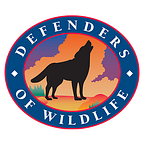The Elephant in the Room…Hung on the Wall
The U.S. Department of the Interior (DOI), under direction from Secretary Ryan Zinke, is establishing a so-called International Wildlife Conservation Council within the U.S. Fish and Wildlife Service. This Council’s name suggests it is broadly focused on wildlife conservation, but one does not have to read closely to see the main focus is simply promotion of hunting. The Council will essentially help Secretary Zinke promote the international sport trophy hunting industry by “increasing public awareness domestically regarding the conservation, wildlife law enforcement, and economic benefits that result from U.S. citizens traveling to foreign nations to engage in hunting.”
Further, the structure of the Council suggests that sport hunting is the only way to increase public awareness of international wildlife conservation and law enforcement. Only 1 of 5 categories for council members is for wildlife and habitat conservation organizations. In addition, not a single suggested council member represents a government in a country where this hunting would take place. Some global council.
International Wildlife Conservation Council Members:
- Wildlife and habitat conservation/management organizations;
- U.S. hunters actively engaged in international and/or domestic hunting conservation;
- The firearms or ammunition manufacturing industry;
- Archery and/or hunting sports industry; and
- Tourism, outfitter, and/or guide industries related to international hunting.
The Council’s responsibilities do not include a single duty solely dedicated to wildlife conservation.
The duties of the Council will be solely advisory and will include, but not be limited to:
- Develop a plan for public engagement and education on the benefits of international hunting.
- Review and make recommendations for changes, when needed, on all Federal programs, and/or regulations, to ensure support of hunting as:
-An enhancement to foreign wildlife conservation and survival;
-An effective tool to combat illegal trafficking and poaching;
-An economic engine and job-creating force for local communities.
- Develop strategies to benefit the U.S. Fish and Wildlife Service’s permit office in receiving timely country data and information so as to remove barriers that impact consulting with range states.
- Recommend removal of barriers to the importation into the United States of legally hunted wildlife.
- Ongoing review of import suspension/bans and provide recommendations that seek to resume the legal trade of those items, where appropriate.
- Review seizure and forfeiture actions/practices and provide recommendations to regulations that will lead to a reduction of unwarranted actions.
- Review the Endangered Species Act’s foreign listed species and interaction with the Convention on International Trade in Endangered Species of Wild Flora and Fauna, with the goal of eliminating regulatory duplications.
- Recommend streamlining/expedite process of import permits.
For a “wildlife conservation council”, it certainly sounds like they will be doing more shooting and stuffing than contributing to conservation efforts. Secretary Zinke probably needs more decorations for the Interior building. The Fish and Wildlife Service’s most recent announcement that elephant trophies can now be legally imported to the U.S, coupled with Secretary Zinke’s installation of the Big Buck Hunter game in the Interior cafeteria, do not lend themselves to a department and agency dedicated to protecting wildlife and conserving wildlife habitat. Interestingly enough, the group that first revealed this reversal, Safari Club International (SCI), has financial ties to Secretary Zinke’s campaign and Montana’s new congressman, Greg Gianforte, who went prairie dog hunting with Donald Trump Jr.
Furthermore, it is worth noting that an actual international council already exists — the International Council for Game and Wildlife Conservation (CIC). CIC’s mission, which began in 1928, is to promote and support the conservation of wildlife and related landscapes, local communities, and traditions through sustainable use. Its vision is a world where wildlife is valued and conserved as part of nature for the benefit of humanity. The CIC works closely with members that include United Nations Institutions, International Non-Governmental Organizations (such as IUCN), National Non-Governmental Organizations and Environmental Conventions (such as CITES and CMS) and serves as a trusted source for global wildlife issues, including combatting wildlife crime and promoting sustainable hunting practices.
- Promote wildlife conservation through sustainable use. Major activity: to communicate sustainable use successes of hunting
- CIC is a global trusted source for global hunting issues — knowledge management
- Combat wildlife crime. Major activity: to promote regulated hunting as an important tool against wildlife crime
The priorities of CIC are in line with a balance and partnership between wildlife conservation and hunting. By contrast, Secretary Zinke’s council offers no hope for an equal and fair collaboration dedicated to the protection of the world’s wildlife. Tellingly, although he has time to set up a new committee to promote trophy hunting, Secretary Zinke has not called a single meeting of the U.S. Wildlife Trafficking Task Force or the Advisory Council on Wildlife Trafficking — two existing United States entities created and mandated to combat wildlife trafficking.
The Department of the Interior and the United States Fish and Wildlife Service have been tasked with protecting wildlife and improving the quality of our wildlife habitat for imperiled species. Sadly, the narrow-minded focus on sport trophy hunting reflects this administration’s blindness to wildlife conservation. This is a myopic and one-sided approach that ignores the enormous range of conservation efforts across the globe that focus on preserving habitat, protecting imperiled species, combating wildlife trafficking and promoting non-consumptive ways to enjoy wildlife, like photo-tourism.
Follow us on Twitter, Facebook and Medium to hear the latest from our experts and sign up for our emails to take action and join us in our fight to protect wildlife.
